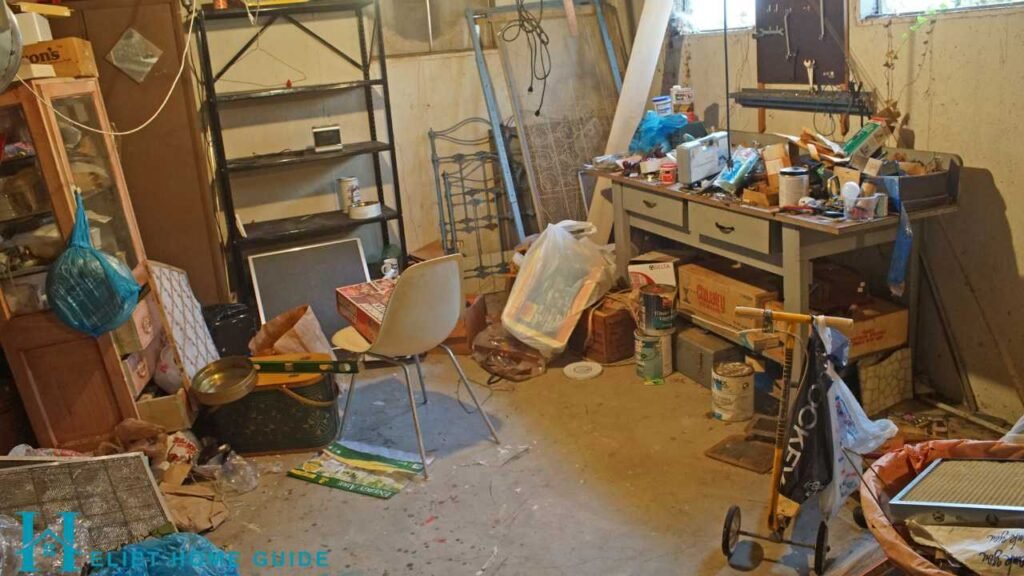To get your home ready for sale, follow these important steps. Start by having your home inspected by a professional to identify any issues that may need attention. Once you know what needs fixing, focus on repairs and upgrades that could increase its value. Finally, improve the appearance of your home, both inside and out, to make it look its best and appeal to potential buyers.
- Get a professional inspection to spot potential problems.
- Make repairs and upgrades to increase your home’s value.
“A thoughtfully prepared home not only sells quicker—it attracts better offers.”
Start with a Pre-Sale Home Inspection
Before listing your home, it’s wise to have a professional inspector examine both the interior and exterior of your property to uncover any problems like faulty plumbing or broken appliances. While your buyer will eventually hire an inspector, conducting your own inspection first can save you from dealing with surprises later. This step allows you to make necessary repairs and upgrades before showing your home to potential buyers, helping avoid any snags during their inspection.
- Inspections typically cover key components like the foundation, roof, kitchen, bathroom, plumbing, heating, and more, and cost around $325 depending on your home’s size and location.
- You should also consider a pest-control inspection to check for any fungal or pest infestations, which usually costs between $75–150.

| Component | What’s Checked |
| Foundation | Cracks, leveling, stability |
| Roof | Leaks, age, shingle condition |
| Plumbing | Leaks, pressure, drainage |
| Electrical | Outlets, breakers, wiring issues |
| HVAC System | Functionality, age, maintenance |
| Kitchen/Bathroom | Appliances, cabinets, fixtures |
“Prevent problems before they happen—inspect before you list.”
Tips for Choosing a Qualified Home Inspector
When you’re selling your home, it’s essential to hire an independent inspector who isn’t connected to your real estate agent. A quality inspector can help you save money by catching issues before potential buyers do. Make sure the inspector is a member of the American Society of Home Inspectors and carries errors-and-omissions insurance to protect you if they make a mistake. They should provide you with a detailed written report, allow you to attend the inspection, and offer references from satisfied clients.
- Independent inspector
- Real estate agent
- Quality inspector
- Written report
- References

| Criteria | Details |
| Independent from Realtor | Unbiased and trustworthy |
| ASHI Member | American Society of Home Inspectors certified |
| E&O Insurance | Protects you in case of inspector errors |
| Written Report | Detailed documentation of inspection findings |
| Attend Inspection | Learn firsthand about your home’s condition |
| References Provided | Ensure reliability and past customer satisfaction |
“An honest inspection today saves a thousand regrets tomorrow.”
Tackle Repairs and Boost Your Home’s Value
Before listing your home for sale, it’s important to resolve any problems found during the home inspection. Neglecting necessary repairs or upgrades can cost you in the long run, as the buyer or their inspector will likely uncover them and ask for a price reduction. Here are two rules of thumb to consider:
- If you have the money for repairs and upgrades, get them done before you list your home. This makes your home look more appealing and hassle-free to potential buyers, and it helps avoid delays in the selling process.
- If funds are tight, disclose any major problems to buyers upfront and reduce your asking price to reflect the cost of the needed fixes. For example, if your home needs a new furnace, lower the asking price accordingly to stay competitive with comparable homes in your area.

| Situation | Recommendation |
| Have repair budget | Fix issues and upgrade to boost appeal and value |
| Tight on funds | Disclose problems and adjust asking price accordingly |
“Fix what’s broken—not just for profit, but for peace of mind.”
Enhance Visual Appeal Inside and Out
To improve your home’s appearance before showing it to potential buyers, follow a few steps to boost its overall look. Small improvements can justify a higher asking price. Start by enhancing your curb appeal—spend a little time and money to spruce up the exterior of your home. Consider having the exterior painted, keeping the lawn and landscaping well-groomed, and cleaning the windows, driveways, and sidewalks. Inside, freshen up the space by having the walls professionally painted and replacing old carpet. These changes not only make your home look newer but also leave a positive impression on buyers.
- Sprucing up the exterior and maintaining the landscaping helps create a great first impression.
- Investing in interior updates like replacing carpet and repainting walls can attract more buyers.

| Task | Result |
| Fresh exterior paint | Clean, updated look |
| Lawn care & landscaping | Strong first impression |
| Clean driveways & windows | Boosts overall curb appeal |
- Decluttering & Staging: You didn’t mention decluttering, depersonalizing, or home staging, which are essential in preparing a home for sale.
- Professional Photography: You could suggest hiring a photographer to make the listing stand out online.
- Neutralizing Décor: You haven’t talked about neutralizing personal décor (e.g., bold paint or family photos) to help buyers envision the space as theirs.
- Odor Control & Lighting: Factors like bad smells and poor lighting can quickly turn off buyers but weren’t discussed.
- Energy Efficiency Enhancements: Adding things like LED lighting or a smart thermostat can subtly increase appeal and value.
| Task | Result |
| Repaint walls (neutral tones) | Modern, spacious feel |
| Replace old carpet | Cleaner, fresher interior |
| Deep clean entire home | Move-in ready appearance |
“First impressions don’t get second chances—make them count.”
Clear the Clutter and Create a Neutral Space
Before you list your home, take time to declutter every room. Remove excess furniture, box up knick-knacks, and clear countertops to make your space look larger and cleaner. Depersonalize by storing away family photos, unique art, or bold decorations. This helps buyers imagine themselves living there rather than feeling like guests in someone else’s house.

| Remove | Why |
| Personal photos | Help buyers imagine themselves living there |
| Excess furniture | Make rooms look larger and cleaner |
| Bold or unique décor | Appeal to broader buyer preferences |
“Clear the clutter—let the buyer imagine their future, not your past.”
Use Staging to Highlight Your Home’s Strengths
Consider home staging, which is the process of arranging furniture and décor to highlight your home’s strengths. Even small changes like moving furniture to improve flow or using neutral linens in bedrooms can create a more welcoming atmosphere. Professionally staged homes often sell faster and for more money than unstaged ones.

| Staging Tips | Why It Works |
| Arrange furniture for flow | Creates an inviting layout |
| Use neutral linens & colors | Widens appeal to more buyers |
| Highlight room strengths | Makes key features stand out |
“Staging isn’t decorating—it’s storytelling.”
Let Professional Photos Do the Selling
With most buyers starting their home search online, high-quality listing photos are a must. Clear, high-quality photos can capture more attention and boost the number of showings. Hire a professional photographer who knows how to showcase lighting, angles, and your home’s best features. Avoid dim or blurry photos taken from a phone—they could cost you serious buyer attention.

| DIY Photos | Professional Photos |
| Poor lighting, awkward angles | Bright, inviting, well-composed images |
| Limited appeal | Showcases home’s best features |
“Buyers see your home online first—make sure it looks its best.”
Freshen Up and Brighten Every Room
Before every showing, make sure your home smells fresh. Avoid strong air fresheners and instead open windows or use subtle scents like citrus or vanilla. Also, maximize natural light—open curtains and blinds during the day and replace any dim or burnt-out light bulbs. A bright, fresh home feels more inviting to buyers.
| Element | Tip |
| Natural Light | Open blinds, clean windows |
| Lighting Fixtures | Replace burnt-out or dim bulbs |
| Scent | Use mild, natural scents like citrus or vanilla |
“Let light and freshness tell the story of your home.”
Frequently Asked Questions
Why is a home inspection important before selling?
A pre-sale home inspection helps identify and fix issues early, preventing surprises during buyer inspections and increasing trust, which can lead to smoother negotiations and faster closings.
How much does a home inspection typically cost?
A standard home inspection costs around $300–$400, depending on location and home size. Pest inspections are usually $75–$150 but offer valuable peace of mind and added buyer confidence.
Should I stage my home before listing it?
Yes, staging helps buyers visualize the space better. Properly staged homes often sell faster and for more money by highlighting functionality, flow, and aesthetic appeal in every room.
What upgrades give the best return on investment?
Painting, landscaping, updating flooring, and fixing minor repairs offer the best return. These changes improve visual appeal, reduce buyer objections, and can justify a higher listing price.
How do I choose the right home inspector?
Choose an independent inspector certified by ASHI. Look for one with E&O insurance, good reviews, a detailed report process, and who allows you to attend the inspection.
What should I remove when decluttering my home?
Remove personal photos, bulky furniture, and unique décor. This helps buyers imagine their own life in the space and enhances the home’s sense of cleanliness and spaciousness.
Why are professional photos important in home listings?
High-quality listing photos grab buyer attention online. They highlight your home’s best features, improve click-through rates, and increase in-person showings, making your home more competitive.
What is curb appeal and why does it matter?
Curb appeal is your home’s first impression. A clean yard, fresh paint, and tidy entry make buyers feel welcomed before they even walk through the front door.
How can I make my home smell fresh for showings?
Avoid strong fragrances. Open windows for fresh air, clean thoroughly, and use natural scents like lemon or vanilla to create a neutral and pleasant environment for buyers.
Are energy-efficient upgrades worth it before selling?
Yes. Features like LED lighting, smart thermostats, and energy-efficient appliances appeal to modern buyers and subtly increase your home’s value without large upfront investment.
Conclusion
Preparing your home for sale involves more than a fresh coat of paint—it’s about presenting a property that feels move-in ready, trustworthy, and appealing to a wide range of buyers. By investing in a pre-sale home inspection, addressing necessary repairs, improving visual appeal inside and out, decluttering and staging your space, and showcasing it with professional photography, you set the stage for a faster and more profitable sale. Every thoughtful step you take helps eliminate buyer doubt and enhances the perceived value of your home. In today’s competitive real estate market, a well-prepared home doesn’t just sell—it shines.

Rhys Henry is a Luxury Realtor & Senior Partner at Tyron Ash International, specializing in South East London & Kent Division. A dedicated real estate agent, Rhys is passionate about helping clients navigate buying, selling, and investing in luxury properties with expert guidance and industry-leading strategies.

